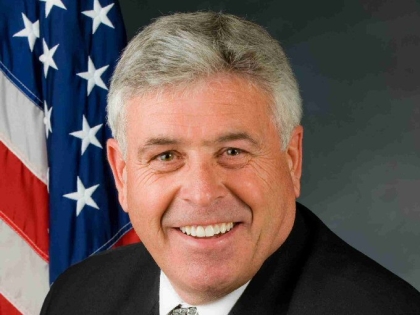
Senator Aubertine Appointed Chair of Legislative Commission on Rural Resources
Darrel J. Aubertine
February 25, 2009
ANNOUNCES PLAN FOR UPSTATE ECONOMIC DEVELOPMENT
(Albany, NY)- Today, Senate Majority Leader Malcolm A. Smith named Senator Darrel J. Aubertine (D-Cape Vincent) as Chair of the New York State Legislative Commission on Rural Resources. As the incoming Chair, Aubertine announced his plans to transform the commission into an engine for substantive public policy initiatives for which the primary function is the economic revitalization of Upstate New York.
Under the leadership of Aubertine and Vice-Chair, Assemblyman David Koon (D-Perinton), the Commission will be dedicated to creating policies that will boost economic revitalization in rural communities throughout Upstate. The commission works directly with a network of more than 10,000 rural residents, advocates, researchers and community and business leaders across Upstate.
“Because of his personal and legislative experiences, Senator Aubertine is a natural choice to lead this commission and help us in our efforts to promote policies that will benefit Upstate New York,” said Senate Majority Leader Malcolm A. Smith. “For the long-term economic growth and revitalization of rural New York, we need a strong commitment to job creation and sound economic development. This commission, driven by substantive public policies initiatives will help cultivate a new economy for Upstate New York,” said Smith.
This is the second leadership post for Senator Aubertine, who in January, was chosen to lead the Senate’s standing Committee on Agriculture.
“Certainly, I’m honored to have been chosen by the leader to head this commission,” Sen. Aubertine said. “As chair of the Agriculture Committee and now as chair of this Commission on Rural Resources, I will continue to promote our state’s agriculture industry and advocate for the day to day needs of our rural communities. But in addition, this Commission can play a tremendous role in creating policy and legislation to get our green economy, the industries of the future, up and running.”
Economic growth in Upstate New York is a priority of the New Senate Leadership. As part of the new Chair’s immediate agenda, it will also strive to ensure that the opportunities available through the Federal American Recovery and Reinvestment Act (the stimulus package) are known to and within the reach those in rural New York who stand to benefit from their existence.
Aubertine and Koon have charged the commission with spearheading the research and drafting of legislation in five key areas, all of which will lead to a more sustainable, stable and prosperous Upstate economy.
1) Farm to Fork: This Commission will promote programs which build bridges between our state’s farmers and organizations, such as schools, colleges, nursing homes and correctional facilities. This opens up new markets for our state’s agriculture industry and provides healthy, local food for these organizations.
2) Green Energy: Agriculture and rural New York can play a key role in the development of alternative energy technologies, manufacturing and production of wind, nuclear, hydropower, solar, biodiesel, cellulosic fuels including ethanol, and other clean energies. With global warming and international conflict forcing our nation to look beyond foreign oil and other fossil fuels, Upstate New York can capitalize on this market trend to create jobs.
3) Green Jobs/Green Partnerships: In addition to green energy, Upstate has a growing industry for environmentally sustainable products which we need to cultivate. By developing incentives for these industries to locate here in New York, working with local small businesses, and through partnerships with SUNY and private universities to advance these innovations, this Commission will work to bring manufacturing jobs back to Upstate.
4) Re-thinking Upstate Infrastructure: If Upstate New York’s economy is going to grow, we need to make sure we can by laying the necessary groundwork for economic viability. This includes maintaining and improving infrastructure for water, sewer, roads, and mass transit, as well as broadband Internet.
5) Rural Healthcare: A key component for improving the quality of life for rural New Yorkers and enticing business investment is improving access to healthcare through programs to recruit more doctors to rural areas, telemedicine and increased awareness of programs available to maintain demand for specialized services.
Joining Smith, Aubertine and Koon were key policy experts in these fields, including Dr. Ray Cross, President of SUNY Morrisville, Peter G. Beatty, Ph.D., Associate Director of Rural Medicine Education at Upstate Medical University, David Haight, New York Director of American Farmland Trust, and Margaret Lamb, School Lunch Program Director, Saratoga Springs School District and a member of Farm to School.
“As an Assembly member of the Rural Resources Commission, Darrel Aubertine was a passionate and dedicated partner who understood the unique character of rural New York,” said Assemblyman David Koon, Vice-Chair of the Rural Resources Commission. “He recognizes that rural New York is too big, too widely dispersed and too diverse to be singularly defined; and that this Commission is necessary to address the myriad social and economic issues that both affect and are affected by rural New York. Now that Senator Aubertine is poised to take over the Commission’s chairmanship, I look forward to partnering with him again in providing our rural communities the resources and opportunities to thrive.”
Established by Chapter 428 of the laws of 1982, the Legislative Commission on Rural Resources is a bi-partisan agency in the state Legislature charged with examining the impact of rural resources on the state’s economy, reviewing existing laws/regulations as they relate to rural resources, assessing the effectiveness of programs designed to promote rural viability, recommending and sponsoring legislation and otherwise promoting activities that will enhance and protect rural resources.
The Commission hosts conferences, conducts hearings, completes studies, issues reports, responds to constituent concerns, drafts legislation, and interacts with all levels of Government to promote and strengthen the role of rural New York, now and into the future. In this role it is an important resource to lawmakers to inform them about the impact of rural issues on the state as a whole.
###